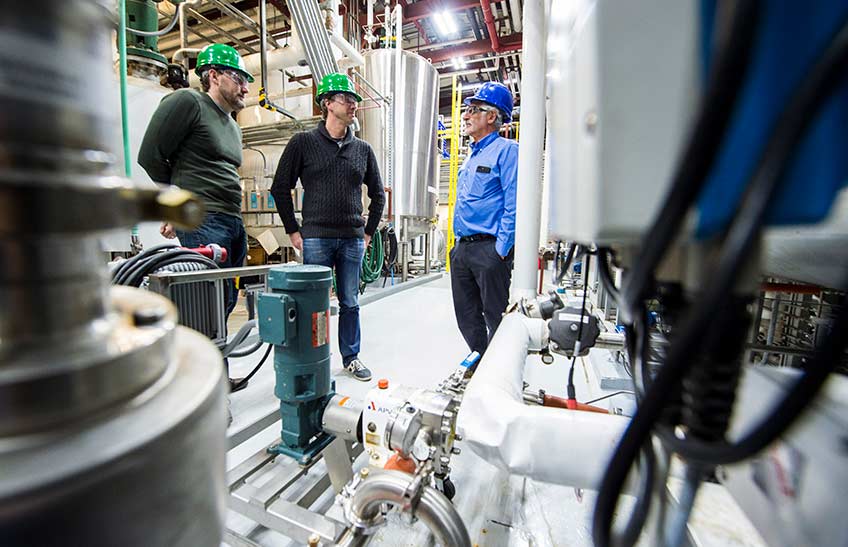Explore our collection of new stories for this topic.
Search or filter for a specific story using the options below.
May 2018
Breakdown Breakthrough: NREL Finds Easier Ways to Deconstruct Biomass
Technical challenges have stymied efforts to produce bioethanol on a commercial scale, but research underway at NREL may hold the key to overcoming those barriers.
News Release: NREL Names Four Scientists Senior Research Fellows
Mowafak Al-Jassim, Andy Walker, Robert McCormick, and Gregg Beckham were chosen for their significant contributions to NREL and the larger scientific community.
News Release: NREL's Gregg Beckham Wins Prestigious Royal Society of Chemistry Award
Gregg Beckham, a senior research fellow and group leader at NREL, was awarded the prize for the development of hybrid biological-catalytic and recycling processes to convert biomass and waste plastics to useful chemicals and high-value materials.
Remember the Algae that Went to Space? Here's What Happened Next
NREL scientists and Chatfield High School students are seeing the results of their collaborative experiment that sent a novel bioreactor housing two different strains of algae into space last summer.
April 2018
Co-Optima Transportation Ingenuity Capitalizes on Strengths of U.S. Energy Resources and Existing Infrastructure
The FY17 Year in Review describes recent advances including identification of key properties for new fuels, assessment of compatibility with vehicle components and infrastructure, and expansion of research to encompass solutions for the entire on-road fleet. This research effort, led by the National Renewable Energy Laboratory (NREL) for the U.S. Department of Energy (DOE), is providing industry with the scientific underpinnings needed to accelerate introduction of high-performance fuels and engines that reduce energy consumption, improve air quality, and lower drivers' costs.
News Release: Research Team Engineers a Better Plastic-Degrading Enzyme
A breakthrough in enzyme research led by the U.S. Department of Energy's National Renewable Energy Laboratory (NREL) and the United Kingdom's University of Portsmouth has led to an improved variant of an enzyme that can breakdown ubiquitous plastic bottles made of polyethylene terephthalate, or PET.
March 2018
News Release: NREL Discovers Enzyme Domains that Dramatically Improve Performance
By studying and comparing the workhorse cellulose-degrading enzymes of two fungi, researchers from the National Renewable Energy Laboratory have pinpointed regions on these enzymes that can be targeted via genetic engineering to help break down cellulose faster.
NREL Briefs Congressional Committee on Impact of Scientific Innovations on Transportation Future
On March 7, NREL's Laboratory Program Manager for Vehicle Technologies John Farrell briefed the U.S. House of Representatives Committee on Energy and Commerce on how the Energy Department and the national labs are driving innovation to spur advances in the efficiency and performance of fuels, vehicles, and the broader transportation system.
February 2018
Breakthroughs Move Researchers One Step Closer to $35 Billion Fuel Savings
NREL and its partners recently revealed breakthroughs in identification of fuel blendstocks for the U.S. Department of Energy's Co-Optimization of Fuels & Engines initiative. This national research effort is providing industry with the scientific underpinnings needed to accelerate introduction of high-performance fuels and engines that reduce energy consumption, improve air quality, and lower drivers' costs.
News Release: NREL Scientists Model Methane-Eating Bacteria
A research team including scientists from the National Renewable Energy Laboratory explored the possibilities provided by the natural world by researching how the bacteria Methylomicrobium alcaliphilum 20ZR uses methane, an abundant greenhouse gas, and converts it to valuable product precursors.
Share
Last Updated May 5, 2025


